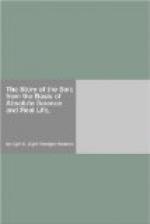“Now right here is probably as poor a piece of land as there is on the farm. This land will positively not grow a crop worth harvesting unless it is well fertilized.”
“If we were in the Illinois corn belt,” replied Percy, “I should expect to find the land in this position to be the most productive on the farm. Our level uplands are now valued at from one hundred fifty to two hundred dollars an acre. A farm of one hundred eighty acres, five miles from town, sold for two hundred and fourteen dollars an acre a few days before I started east.”
“Well,” said Mr. West, “this may have been good land once, but if so it was before my time. Of course most of our uplands here have been cropped for upwards of two hundred years; and about all that has ever been done to keep up the fertility of the soil has been to rotate the crops. To be sure, the farm manure has always been used as far as it would go, but the supply is really very small compared to the need for it.”
“Do you think that the proper rotation of crops would maintain the fertility of the soil?” asked Percy.
“No, I have tried too many rotations to think that, but I suppose it is a help in that direction, don’t you?”
“I would say that crop rotation may help to maintain the supply of some important constituents of a fertile soil, but it will certainly hasten the depletion of some other equally essential constituents.”
“Well, that’s a new idea to me. I may not quite grasp your meaning; but first tell me about these tests you are making.”
When they stopped on the area of poor land as designated by Mr. West, Percy had turned his auger into the earth and drawn out a sample of moist soil, which he molded into the form of a ball. He broke this in two, inserted a piece of blue paper, and pressed it firmly together. He then laid the ball of soil aside, secured another sample with the auger, and formed it into a cake with a hollow in the upper surface. He took from his pocket a slender box or tube of light wood, removed the screw cap, and drew out a glass-stoppered bottle.
“This bottle contains hydrochloric acid,” said Percy. “It is often incorrectly called ‘muriatic acid.’ It consists of two elements, hydrogen and chlorin, from which its name is derived. But you are perhaps already familiar with the chemical elements.”
“Well, I heard lectures at William and Mary for four years, and they included some chemistry as it was then taught; but they certainly did not include the application of chemistry to agriculture, and I am greatly interested to know the meaning of these tests you are making here on our own farm under my own eyes. You may take it for granted that I know absolutely nothing of such use of chemistry as you are evidently turning to some practical value.”
“Any other farmer can make these tests as well as I can,” said Percy. “This bottle of acid cost me fifteen cents and it can be duplicated for the same price at almost any drug store. The acid is very concentrated, in fact about as strong as can easily be produced, but it need not be especially pure. Some care should be taken not to get it on the clothing or on the fingers, although it is not at all dangerous to handle, but it tends to burn the fingers unless soon removed, either by washing with water or by rubbing it off with the moist soil.”




